The web has drastically changed in the last few years with Google now often used as a “search engine of search engines” – we rely on it more than we probably realize. Keywords Research tools for Google are now an integral part of many Digital Marketers.
What was once a simple text list of relevant websites returned by a ‘web crawler’ is now an immensely sophisticated and complex system that’s part brute computing force and part black magic.
It’s easy to forget how powerful and all-encompassing Google has become, even though most of us use it daily, if not multiple times per day.
More than 6 billion searches are performed every day on Google alone 😯! And this number continues to grow with each passing year with no sign of slowing down.
This increase is partly fueled by the increase in the number of internet users worldwide (which is growing annually at around 10%) but it’s also down to an increase in user sophistication and expectation.
Google has changed the game, plain and simple.
As search marketers, we need to adapt to it if we’re going to stand any chance of success online…and that means staying ahead of the curve when it comes to tools and SEO techniques for doing keyword research properly.
Because without high-quality keywords you can forget about targeted traffic or relevant organic search engine rankings.
The days of ‘just picking some random words’ are long gone – Google demands more these days.
But don’t panic!
It doesn’t have to be complicated or difficult if you’ve got the right guidance and tools.
Keyword research is an essential part of SEO. However, it is often underrated.
Some people think that it is only the on-page SEO factors like URL structure or website architecture that matter when getting higher rankings, but doing thorough keyword research can give you a huge edge over your competitors.
As someone who has been optimizing websites for more than 15 years, I know how frustrating it can be to spend hours researching keywords and then come up with nothing useful.
If you do the keyword research correctly, you can find hundreds of thousands of search terms that are relevant to your niche.
In this post, I’m going to show you eight keyword research tools that I have been using for years to come up with profitable keywords for my SEO campaigns.
If you are doing this for the first time or simply need to improve your strategy here are 8 must-have top keyword research tools you should definitely be using in 2022.
Let’s get started!
Tool #1: Google Trends
Google Trends is one of my favorite tools because it has so much potential.
And it also shows trends over time which can help you predict future search patterns based on current data.
For example, I could check how many people are searching for the keyword ‘weight loss’ this week vs. last week or even 5 years ago, and this can help me predict whether or not it is a growing (or declining) keyword.

You can also discover related keywords then compare new keywords to old ones.
Anyone into SEO or small business should use Google trends because it helps you stay ahead of the curve and be more proactive about your keyword research.
Tool #2: Google Keyword Planner
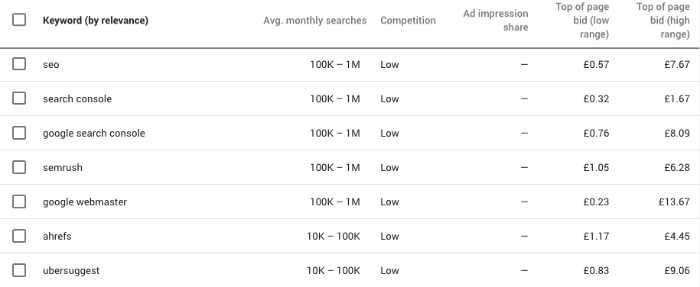
This is Google’s very own keyword research tool, and while it hasn’t always been great, it’s definitely improved in recent years.
It can be used to get monthly search volume data on fairly broad keywords (around 1 million monthly searches or more), but you will need to sign up for Adwords to be able to use it.
This also means that it’s not always accurate and can be misleading, but if you’re looking for keyword volume data and plan to advertise on Google anyway (which is what they won’t), this may be a good option.
A lot of SEOs swear by this tool because it gives you access to actual search volumes and is Google’s own product, so it’s pretty much as accurate as you can get.
Also, a lot of newbies don’t have the budget for expensive tools, and this is a free option that can give some decent results.
Tool #3: Answer the Public
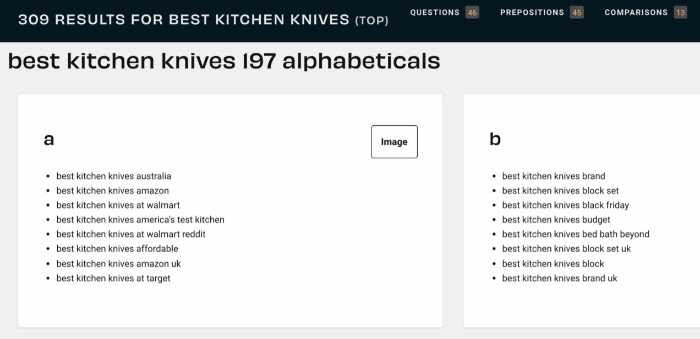
Answer the Public is an incredibly powerful tool that has drastically changed the way I do keyword research.
It does what it says on the box – you simply paste in a seed keyword and up pops a huge list of questions people are asking (and how often they’re asking them) about your topic. And it’s not just a list of generic questions – you often get incredibly specific ones too.
It’s one of the most insightful keyword research tools I’ve ever used and can help you to come up with high-quality keywords that your competition may not even know about yet. Here’s an example:
Answer The Public is also great for generating post ideas and content ideas in general, and it’s one of my favourite tools.
Tool #4: Keyword Shitter
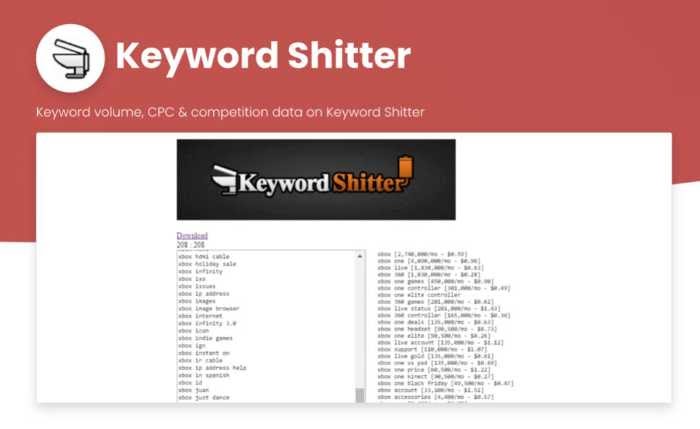
Keyword Shitter is a nifty little tool that spits out a huge list of keywords based on a seed keyword.
The results are basically endless and can be exported to CSV or sorted by the search volume.
What I like about this tool is that it gives you a lot of long-tail keywords, and while they aren’t as high or low in search volume, they can add up.
The only drawback here is the lack of filtering options – you get your full list no matter what. But if you find a few gems from this list, that’s all that matters.
Tool #5: SEMrush

SEMrush is a great keyword research tool, but it’s also one of my favourites for doing competitor analysis.
It’s a really powerful platform that can provide you with some valuable insights into how your competitors are ranking for certain keywords. Here’s what the results look like:
You can see which of your competitor’s pages rank where (including their domain and page authority), and then use this data to build your own keyword strategy.
It’s also great for discovering new keywords, high quality backlinks, and finding other domains that are ranking well for certain terms.
Tool #6: KW Finder
KW Finder is one of my favourite keyword research tools for finding both low and high volume keywords. It’s very affordable (especially if you sign up for an annual plan) and will give you lots of data to play around with.
As well as the search volume, this tool will also show you the PPC value, cost-per-click, estimated clicks per day, keyword difficulty score and SERP features.
It also has a really useful negative keywords feature that will help to narrow down your results even more.
Tool #7: Long Tail Pro
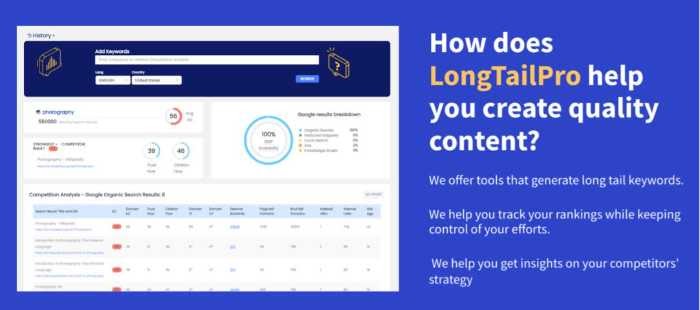
Long Tail Pro is another top keyword research tool that provides lots of different data and suggestions.
The thing I like most about this tool is that it’s really easy to use and provides some great keyword suggestions (with search volume data).
One of the best features here is the ‘related keywords’ option which will give you a huge list of low-competition long-tail terms that may not have occurred to you otherwise.
It’s not the cheapest tool, but it’s definitely worth the money if you’re serious about your content marketing.
Tool #8: SpyFu.com
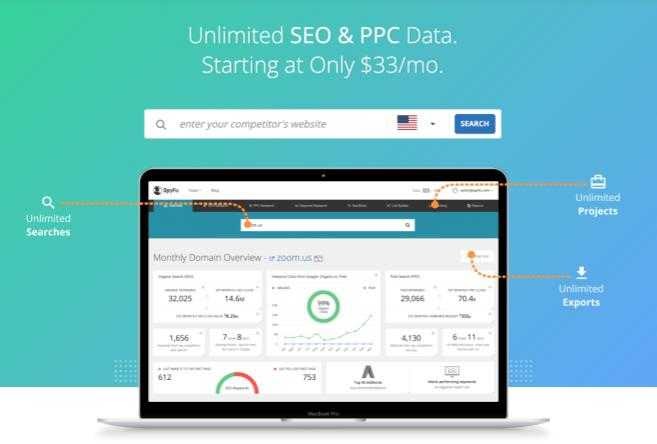
SpyFu is an online service that promises to help people find the highest paying keywords for their search engine marketing campaigns.
According to SpyFu, they have indexed billions of dollars of AdWords data.
Many SEOs rely on SpyFu for accurate data about AdWords.
Other tools that rely on the SpyFu API include Market Samurai, KeywordSpy, and many others.
SpyFu can be useful for competitive research. A competitor’s campaigns can be viewed with SpyFu by entering their domain name into the SpyFu search field.
Knowing the keywords that are being bid on most aggressively, and how much they are spending per click can help people adjust bids or possibly pick up niches where the competition is low.
It is a helpful tool to use when building out a site’s SEO campaign.
Knowing the best keywords to target with ads, and which keywords are least profitable helps optimize the campaign for maximum profitability.
SpyFu scrapes AdWords by sending users that are logged into Adwords to their site. It then parses the ad copy to extract keywords.
They provided this statement on their privacy policy:
“SpyFu never has access to your AdWords login or account information. Instead, it sends users that are logged into Adwords over to SpyFu’s site via an iframe. They do not get access to anything else you might be doing in your browser. Once they are on the website, the only thing passed back to Adwords is a list of keywords with corresponding bidding price and CTR. This information is never passed back from SpyFu, so it is only available within AdWords. “
Final Takeaways:
As we said earlier, Google will always be the top dog when it comes to SEO strategy.
However, if you want your site to rank above your competitors and make a name for yourself online, then these tools can help you to do just that.
Start testing them out now and see what works best for you! If you need any help with this, drop me a comment and I’ll do my best to answer.
Did we miss any keyword research tools that you think should be on this list? Let us know in the comments section below 😀



